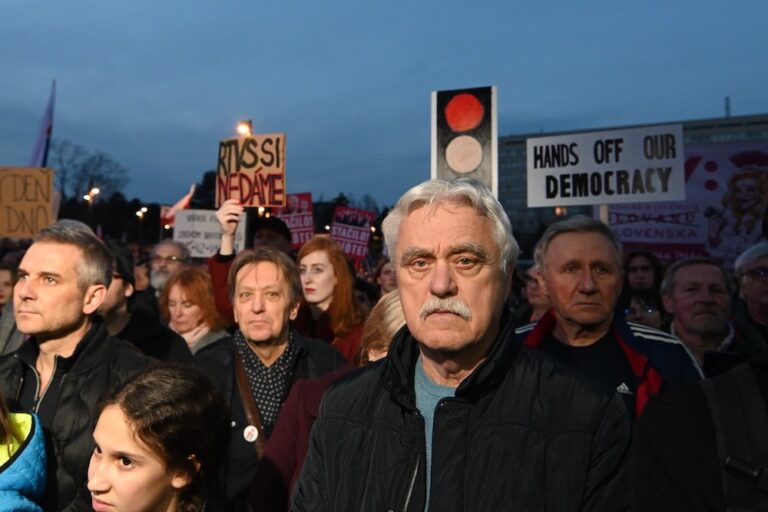(ARTICLE 19/IFEX) – The following is an ARTICLE 19 memorandum on the draft mass media law of the Slovak Republic: MEMORANDUM On the DRAFT MASS MEDIA LAW Of the SLOVAK REPUBLIC BY ARTICLE 19 The International Centre Against Censorship London August 1999 Introduction ARTICLE 19, The International Centre Against Censorship, has been asked to comment […]
(ARTICLE 19/IFEX) – The following is an ARTICLE 19 memorandum on the draft
mass media law of the Slovak Republic:
MEMORANDUM On the DRAFT MASS MEDIA LAW
Of the SLOVAK REPUBLIC
BY ARTICLE 19
The International Centre Against Censorship
London
August 1999
Introduction
ARTICLE 19, The International Centre Against Censorship, has been asked to
comment upon a draft mass media law which has been prepared by the Slovak
Syndicate of Journalists.
ARTICLE 19 welcomes the draft and regards it as an extremely positive
contribution to the advancement of freedom of expression, and specifically
the freedom of the media, in the Slovak Republic.
ARTICLE 19 particularly welcomes the references to the European Convention
of Human Rights throughout the draft law, including use of the wording found
in Article 10 of the Convention. The absence of content restrictions,
government controls over the practice of journalism or the day-to-day
functioning of the media, as well as strong protection for journalists’
confidential sources and the specific acceptance of reduced privacy
protection for public figures performing their public duties are all to be
warmly applauded. Limitations on the scope of the right to reply and the
provision for in-house codes of practice to protect editors from undue
influence by owners or trade unions are also to be welcomed.
The following analysis sets out the obligations which international law
imposes upon Slovakia in relation to freedom of expression in general and
then suggests a number of changes to the Draft Media Law to ensure that it
genuinely reflects the highest standards of freedom of expression.
The Slovak Republic’s Obligations to respect Freedom of Expression Under
International Law and the Constitution
The Slovak Republic is a party to both the European Convention on Human
Rights and Fundamental Freedoms and the International Covenant on Civil and
Political Rights. Both of these international human rights treaties protect
freedom of expression in similar terms. Article 10 of the European
Convention states:
1. Everyone has the right to freedom of expression. This right shall include
freedom to hold opinions and to receive and impart information and ideas
without interference by public authority and regardless of frontiers. This
article shall not prevent states from requiring the licensing of
broadcasting, television or cinema enterprises.
The overriding importance of freedom of expression as a human right has been
widely recognised, both for its own sake and as an essential underpinning of
democracy and means of safeguarding other human rights. At its very first
session in 1946 the United Nations General Assembly declared it:
A fundamental human right and … the touchstone of all the freedoms to
which the United Nations is consecrated.1
The European Court of Human Rights has also recognised the key role of
freedom of expression:
Freedom of expression constitutes one of the essential foundations of
society, one of the basic conditions for its progress and for the
development of every man … it is applicable not only to “information” or
“ideas” that are favourably received … but also to those which offend,
shock or disturb the State or any other sector of the population. Such are
the demands of pluralism, tolerance and broadmindedness without which there
is no “democratic society”.2
International jurisprudence has also consistently emphasised the special
role of the free media in a State governed by the rule of law. For example,
the European Court of Human Rights has stated:
Freedom of the press affords the public one of the best means of discovering
and forming an opinion of the ideas and attitudes of their political
leaders. In particular, it gives politicians the opportunity to reflect and
comment on the preoccupations of public opinion; it thus enables everyone to
participate in the free political debate which is at the very core of the
concept of a democratic society.3
Freedom of expression is also protected by Article 26 of the Constitution of
the Slovak Republic which states:
(1) Freedom of expression and the right to information shall be
guaranteed.
(2) Every person has the right to express his or her opinion in words,
writing, print, images and any other means, and also to seek, receive and
disseminate ideas and information both nationally and internationally. No
approval process shall be required for publication of the press. Radio and
television companies may be required to seek permission from governmental
authorities to set up private businesses. Further details shall be provided
by law.
(3) Censorship shall be prohibited.
Freedom of expression is not, however, absolute. Every system of
international and domestic rights recognises carefully drawn and limited
restrictions on freedom of expression to take into account the values of
individual dignity and democracy. Under international human rights law,
Slovak laws which restrict freedom of expression must comply with the
provisions of Article 19(3) of the ICCPR and Article 10(2) of the ECHR.
Article 10(2) is in the following terms:
The exercise of these freedoms, since it carries with it duties and
responsibilities, may be subject to such formalities, conditions,
restrictions or penalties as are prescribed by law and are necessary in a
democratic society, in the interests of national security, territorial
integrity or public safety, for the prevention of disorder or crime, for the
protection of health or morals, for the protection of the reputation or
rights of others, for preventing the disclosure of information received in
confidence, or for maintaining the authority or impartiality of the
judiciary.
Article 19(3) of the ICCPR and Article 26(4) of the Slovak Constitution are
in similar terms. Accordingly, restrictions on freedom of expression must
meet a strict three-part test.4 First, the interference must be provided for
by law. This implies that the law is accessible and “formulated with
sufficient precision to enable the citizen to regulate his conduct.”5
Second, the interference must pursue one of the legitimate aims listed in
Article 10(2); this list is exclusive. Third, the interference must be
necessary to secure that aim. This implies that it serves a pressing social
need, that the reasons given to justify it are relevant and sufficient and
that the interference is proportionate to the legitimate aim pursued.6 This
is a strict test, presenting a high standard which any interference must
overcome.
As one of the most fundamental rights recognised by the international
community, a genuine commitment to freedom of expression and of the media
necessitates a high threshold of tolerance in relation to all kinds of
publications and broadcasts. The guarantee implies at least a media able to
criticise the government and public figures without fear, as well as a
citizenry freely able to receive and impart information and ideas of all
kinds. Any media law should be drafted with these considerations uppermost
in mind.
Specific Comments on the Draft Media Law
In most respects the draft law is fully consistent with Slovakia’s
international obligations in relation to freedom of expression. Some
provisions, however, are inappropriate, require clarification or could
benefit from further safeguards.
Right to Information
Article 3 of the draft law establishes the right of mass media
representatives to access official information.
While access to official information is a fundamentally important aspect of
the right to freedom of expression and is guaranteed by Article 26(5) of the
Slovak Constitution, it is unfortunate and inappropriate to restrict such
access to members of the media. There are two reason for this.
Firstly, as an aspect of the right to freedom of expression, the right to
access official information belongs to all those within the territory of the
Slovak Republic. A proper general access to information law should be
enacted to guarantee such a right. Since the media could take advantage of
such a right there should be no reason to provide for a special access
regime within the media bill.
The provision is also inappropriate because of the relationship it
inadvertently creates between the media and the holders of official
information. It is vital that the media in general develop sufficiently
independently of the State to enable journalists and others within the media
to act as the “watchdog” of government. If the release of official
information is only possible through the media there is a danger that the
media itself could become associated with the dissemination of official
information and journalists could see this, either consciously or
unconsciously, as part of their role. Such a situation must be avoided.
Clearly, a regime for access to official information can be extremely
important in the conduct of investigative journalism and such a regime
should be introduced. The provision as it stands, however, is inappropriate
and should be removed.
Confidentiality of Personal Data
Article 5 of the Draft Media Bill restricts the publication of personal data
although it does limit this protection for public figures carrying out their
official duties.
While it is certainly legitimate to protect the legitimately private affairs
of private individuals, there may be situations in which the release of such
information is in the public interest. For this reason it is inappropriate
to establish a blanket ban on the release of such information. A public
interest override test should be inserted into the section to allow for the
release of legitimately personal information where the public interest in
its release is greater than interest of the individual concerned in keeping
the information private.
Right to Excusable Mistake
Article 7 appears to require media practitioners to verify any information
from confidential sources in order to avoid liability for publishing
incorrect or misleading information.
While ARTICLE 19 welcomes the move away from the currently strict liability
of journalists for the publication of incorrect information, the Article
remains problematic.
While proper verification of information before publication is, of course, a
fundamental requirement of professional journalistic practice, it is more
appropriately dealt with through professional codes of ethics. Most
significantly, the imposition of sanctions upon a media practitioner for
publishing so-called “incorrect” or “misleading” information, which the
Article appears to contemplate, is unacceptable from the perspective of the
international guarantee of freedom of expression. News is a perishable
commodity and journalists and others cannot be expected to guarantee the
accuracy of the information they publish in all circumstances. Moreover, to
require the publication of only “correct” information may lead to the
imposition of officially sanctioned “truth” and could have a significantly
chilling effect on the freedom of expression of media practitioners.
The provision should be removed from the draft Bill.
Right of Correction
Articles 11 to 14 establish the right of correction for factual information
published about a person, which that person regards as inaccurate or
misleading.
While ideally rights of correction and reply should be dealt with through
voluntary codes of practice, the provisions in the draft law are well within
the requirements of international law and accord with the practice in a
number of European States. Only Article 12(2), forbidding comment on a
published correction in the same issue, is inappropriate.
While it is to be hoped that journalists will not enter into a petty
tit-for-tat argument when printing replies or corrections, this matter is
best dealt with through self-regulation. Media outlets should be free to
make whatever comments they wish about a correction and a blanket ban on
such comment is unnecessary.
Anti-Monopoly Measures
Article 17 establishes certain restrictions on ownership and control of
media outlets to avoid media monopolies and to ensure diversity of content
throughout the media.
While it is certainly true that the Slovak republic has an obligation to
ensure an environment where the widest diversity of opinions and information
content is available to its citizens both through the media and otherwise,
it is by no means clear that this goal is effectively achieved through
blanket bans on cross-media ownership and control. The provisions in Article
17 take no account of the relative influence of any publication or
broadcasting station and are rigid in an area where flexibility in the
public interest is required.
In these circumstances ARTICLE 19 suggests the establishment of an
independent body with the power to regulate cross-media ownership in the
public interest, taking into account both the public’s right to diversity of
content and the need of commercial media operators to remain financially
viable. Such a body should be completely independent of government,
established via cross-party and public consensus with strict safeguards of
propriety and expertise for its members.
Summary of Recommendations
* Remove Article 3 on access to official information and establish a proper,
general access regime for all within the Slovak Republic.
* Amend Article 5 to establish a test enabling the publication of personal
information where the public interest demands.
* Remove Article 7 on the Right to Excusable Mistake and ensure that no
liability attaches to a media practitioner for the publication of so-called
“false” or “misleading” information.
* Amend Article 12(2) to allow media outlets to comment upon factual
corrections.
* Remove Article 17 and establish an independent body with the power to
regulate cross-media ownership in the public interest.
1 Resolution 59(1), 14 December 1946.
2 Handyside v. United Kingdom, 7 December 1976, 1 EHRR 737.49.
3 Castells v Spain, (1992), Series A, No. 236 , para. 43.
4 See, for example, The Sunday Times v. United Kingdom, 26 April 1979, No.
30, 2 EHRR 245, paras. 45.
5 The Sunday Times, op cit., para. 49.
6 See the ECHR case, Lingens v. Austria, 8 July 1986, 8 EHRR 407, paras.
39-40.


